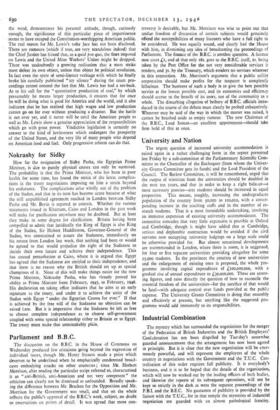University and Nation
The urgent question of increased university accommodation is raised again in a rather challenging form in the report presented last Friday by a sub-committee of the Parliamentary Scientific Com- mittee to the Chancellor of the Exchequer (from whom the Univer- sity Grants Committee gets its funds) and the Lord President of the Council. The Barlow Committee, it will be remembered, urged that the output of scientists from the universities should be doubled in the next ten years, and that in order to keep a right balaiice—a most necessary proviso—arts students should be increased in equal proportion. This means, roughly, increasing the undergraduate population of the country from 50,000 to too,oco, with a corres- ponding increase in the teaching staffs and in the number of re- search students. That is a most formidable undertaking, involving an immense expansion of existing university accommodation. The committee concedes that very little expansion is possible at Oxford and Cambridge, though it might have added that at Cambridge, serious and deplorable contraction would be avoided if the civil servants now occupying university lodgings on a large scale could be otherwise provided for. But almost sensational developments are recommended in London, where there is room, it is suggested, for four or five separate universities providing altogether for some 25,000 students. In the provinces the creation of new universities and the enlargement of existing ones is proposed, the whole pro- gramme involving capital expenditure of Doo,000,000, with a gradual rise of annual expenditure to £30,000,000. These are arrest- ing figures, and raise directly the question of how to reconcile the essential freedom of the universities—for the sacrifice of that would be fatal--with adequate control over funds provided at the public expense. The University Grants Committee is doing that smoothly and effectively at present, but anything like the suggested pro- gramme would add immensely to its responsibilities.


































 Previous page
Previous page